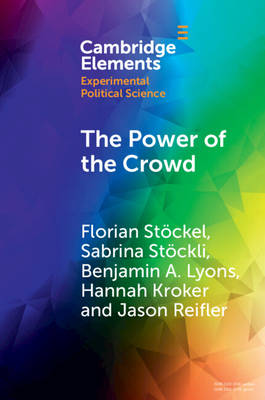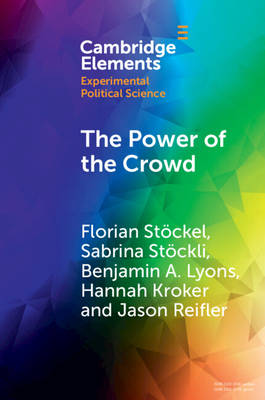
- Afhalen na 1 uur in een winkel met voorraad
- Gratis thuislevering in België vanaf € 30
- Ruim aanbod met 7 miljoen producten
- Afhalen na 1 uur in een winkel met voorraad
- Gratis thuislevering in België vanaf € 30
- Ruim aanbod met 7 miljoen producten
Zoeken
The Power of the Crowd
How the Public Can Both Spoil and Improve Social Media as a Source of Information
Florian Stöckel, Sabrina Stöckli, Benjamin A Lyons
€ 24,45
+ 48 punten
Uitvoering
Omschrijving
This Element explores misinformation as a challenge for democracies, using experiments from Germany, Italy, and the UK to assess the role of user-generated corrections on social media. A sample of more than 170,000 observations across a wide range of topics (COVID, climate change, 5G etc.) is used to test whether social corrections help reduce the perceived accuracy of false news and whether miscorrections decrease the credibility of true news. Corrections reduce the perceived accuracy of misinformation, but miscorrections can harm perceptions of true news. The Element also assesses the mechanisms of social corrections, finding evidence for recency effects rather than systematic processing. Additional analyses show the characteristics of individuals who have more difficulties identifying false news. Survey data is included on characteristics of people who write comments often. The conclusion highlights that social corrections can mislead, but also work as remedy. The Element ends with best practices for effective corrections.
Specificaties
Betrokkenen
- Auteur(s):
- Uitgeverij:
Inhoud
- Aantal bladzijden:
- 98
- Taal:
- Engels
- Reeks:
Eigenschappen
- Productcode (EAN):
- 9781009677134
- Verschijningsdatum:
- 6/11/2025
- Uitvoering:
- Paperback
- Formaat:
- Trade paperback (VS)
- Afmetingen:
- 152 mm x 229 mm
- Gewicht:
- 140 g

Alleen bij Standaard Boekhandel
+ 48 punten op je klantenkaart van Standaard Boekhandel
Beoordelingen
We publiceren alleen reviews die voldoen aan de voorwaarden voor reviews. Bekijk onze voorwaarden voor reviews.







